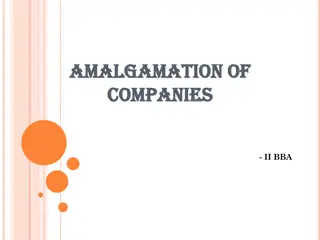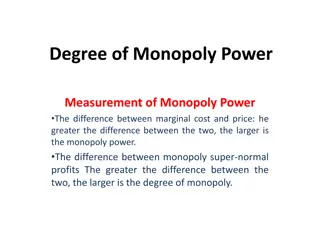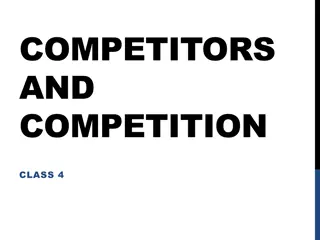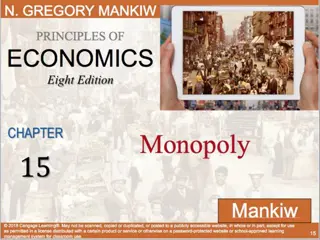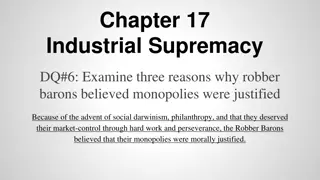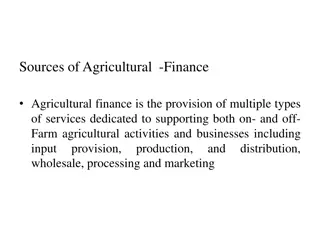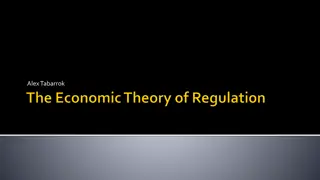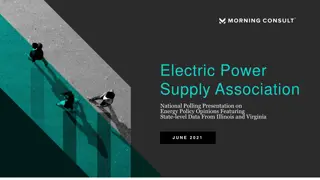United States v. Microsoft Corporation
The historical significance of Standard Oil and United States v. Microsoft Corporation in the context of antitrust laws, monopolies, and business practices. Learn about the rise of megacorps through efficiency, integration, and market dominance, contrasting wealth accumulation with royal fortune. De
4 views • 18 slides
Understanding Antitrust: Role, Objectives, and Challenges in Modern Economics
Antitrust laws aim to promote fair competition, protect consumer welfare, and uphold economic efficiency. The Antitrust authority plays a crucial role in preventing abuses, cartels, and monopolies, ultimately benefitting consumers through lower prices, innovation, and choice. The evolving landscape
6 views • 73 slides
Understanding Market Structures and Competition
Exploring market structures such as perfect competition and monopolies, this content delves into the characteristics, implications, and types of different market environments. Perfect competition involves many buyers and sellers offering identical products, whereas monopolies arise from barriers pre
0 views • 31 slides
Market Structures: Perfect Competition vs Monopoly
Perfect competition features identical products, many sellers, and low barriers to entry, promoting efficiency. Monopolies, with one seller, can abuse power but are allowed in select industries. Understanding market structures is crucial for economic analysis and policy-making.
0 views • 23 slides
Amalgamation of Companies: Types, Advantages, and Disadvantages
Amalgamation of companies involves combining two or more entities to form a new company. This process can result in benefits such as increased capital, reduced costs, and improved research facilities. However, it may also lead to market monopolies and challenges in management. Two main types of amal
0 views • 7 slides
Understanding Monopoly Power and Regulation in Economics
Degree of Monopoly Power is measured by the difference between marginal cost and price, with a greater difference signifying larger monopoly power. Prof. Abba P. Lerner's formula for monopoly power emphasizes the gap between price and marginal cost. Monopoly power can also be assessed using price el
0 views • 4 slides
Evolution of Broadband Internet in Germany
Personal background of Lutz Donnerhacke, founder of Individual Network e.V., and his journey from C64 to Linux to FreeBSD. Insights into the broadband landscape in Germany, including the historical context, political influence, and technological advancements. Discussion on Layer 2 bitstream access a
0 views • 19 slides
Navigating the Complex World of Antitrust Law with LDM Global
In today\u2019s dynamic business environment, maintaining fair competition is crucial for a healthy market economy. Antitrust laws, designed to prevent monopolies and promote competition, play a pivotal role in ensuring that businesses operate on a l
1 views • 13 slides
Understanding Poverty in Elizabethan England
The poor in Tudor England faced harsh living conditions, with the working poor comprising half of all families. Illiterate and landless, they spent most of their income on basic needs, struggling to survive. The poverty crisis was exacerbated by factors like rising population, inflation, trade issue
0 views • 12 slides
Future of Medical Innovation and Access for People in Need
Challenges in accessing affordable medicines persist due to high prices and pharmaceutical monopolies. The need for change is emphasized by the Access Campaign, advocating for ending patent abuse, promoting R&D responsibility, and debunking myths around medicine pricing. Global momentum is sought to
1 views • 14 slides
Understanding Competition in Market Structures & Antitrust Laws
Competition is the driving force in various market structures. Competitors make strategic choices that impact each other directly or indirectly. Antitrust laws prevent anti-competitive behavior like monopolies. The SSNIP test helps identify relevant markets for assessing competition. The case study
0 views • 12 slides
Understanding Monopolies in Economics
Monopolies are considered inefficient because they can earn long-term profits. In a monopoly equilibrium, the relationship between price, marginal revenue, and marginal cost differs. Natural monopolies can supply goods at lower costs. Compared to perfectly competitive firms, monopolies charge higher
0 views • 14 slides
Exploring Robber Barons and Monopolies in Industrial Supremacy
Robber barons in the late 1800s believed monopolies were morally justified due to social Darwinism, philanthropy, and their perceived right to control markets through hard work. Examples include Carnegie's steel, Rockefeller's oil, Morgan's banking, and Ford's automotive monopolies. Maintaining cons
0 views • 11 slides
Challenges and Reforms in the Progressive Era: Power Struggles of Big Business
The Progressive Era was marked by the dominance of large business monopolies, leading to suppressed competition, exploitation of laborers, and economic control. Reformers aimed to regulate corporations, ensure fair competition, and expose corruption through muckraking journalism. Notable figures suc
0 views • 9 slides
Agricultural Finance and Banking System Overview
Agricultural finance encompasses various services to support farm activities, with sources including institutional and non-institutional channels. In India, agricultural credit is available from sources like moneylenders, co-operatives, and commercial banks. Commercial banks play a crucial role in p
0 views • 12 slides
Insights on Regulation, Market Failures, and Capture Theory
Disciplined monopolies internalize externalities and enhance social welfare, but small groups with large potential benefits often drive regulation for self-interest. Capture theory suggests regulatory capture by firms over time, leading to favoritism and high rates of return for regulated industries
0 views • 23 slides
Optimal Pricing Strategies for Multiproduct Monopolies
This chapter delves into optimal pricing strategies, focusing on subadditivity and multiproduct monopolies. It explores the concept of natural monopolies in a multiproduct setting and analyzes the design of pricing policies for firms supplying single or multiple services. Discussions cover linear pr
0 views • 19 slides
Understanding Mergers and Monopolies in Business
Explore the intricacies of mergers and monopolies, the reasons for intervention, the merger process, stakeholder roles, challenges, and key determinations. Learn why regulatory bodies monitor and control mergers to prevent anti-competitive behavior and maintain market balance. Discover how businesse
0 views • 17 slides
Public Opinion on Energy Policy: Competitive Markets vs. Energy Monopolies
Voters prefer competitive power markets for lower costs, renewable energy use, reliable service, and positive outcomes. Reliability and affordability are key concerns. Most support renewable resources but also non-renewable power plant maintenance. State-level data reveals specific opinions in Virgi
0 views • 24 slides
Ayala Back to School 2021-2022 Information for Mr. Gracia's Economics Class
Get ready for the academic year with all the essential details for Mr. Gracia's Economics class at Ayala High School. The course covers topics such as Macroeconomics, Microeconomics, GDP, Inflation, Unemployment, S&D, Free Market, Monopolies, and Personal Finances. Stay updated on assignments, notes
0 views • 9 slides




